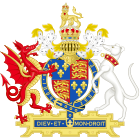Statute of Sewers facts for kids
Quick facts for kids Act of Parliament |
|

|
|
| Long title | A general Act concerning Commissions of Sewers to be directed in all parts within the Realm. |
|---|---|
| Citation | 23 Hen. 8. c. 5 |
The Statute of Sewers was an important law made in 1531 by King Henry VIII's Parliament in England. This law was created to help manage and control waterways like rivers and drainage systems across the country. It made sure that special groups, called "commissions of sewers," had lasting power to do their job.
Before this law, these groups had to get their powers renewed by Parliament every time. The Statute of Sewers changed this, giving them permanent authority.
Contents
What Was the Statute of Sewers?
The Statute of Sewers was a law passed in 1531. It was made by the English Reformation Parliament during the reign of King Henry VIII. The main goal of this law was to give permanent power to groups called "commissions of sewers."
Why Was This Law Needed?
Imagine a time when rivers and drainage systems needed constant care. People needed to make sure water flowed properly to prevent floods and keep land usable. Before this law, the groups in charge of this work, the "commissions of sewers," only had temporary power. Each time, Parliament had to vote to give them power again. This made it hard for them to plan long-term projects. The 1531 Statute of Sewers fixed this problem by making their powers permanent.
What Powers Did This Law Give?
This law gave the commissions of sewers some very important powers.
- They could make their own rules, like mini-laws, about how to manage the waterways.
- They could collect taxes from landowners to pay for the work needed.
- If people didn't pay these taxes, the commissions could fine them.
King Henry VIII's Special Power
The Statute of Sewers is also famous for another reason. It's one of the first times in English history that a "Henry VIII power" was used. This means the law gave a group (the commissions) the power to make rules that were almost like laws themselves. It was a way for the King and Parliament to let certain groups handle specific tasks without needing Parliament's approval for every small detail.
 | Selma Burke |
 | Pauline Powell Burns |
 | Frederick J. Brown |
 | Robert Blackburn |

